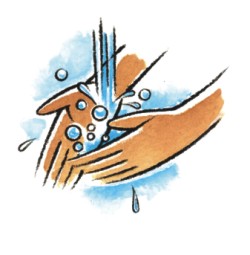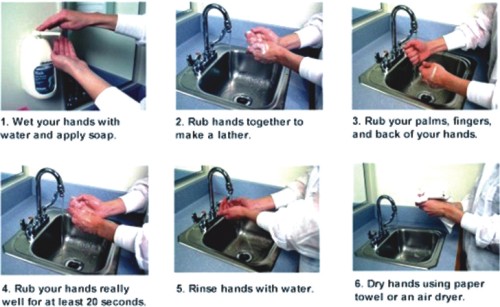Health
Wash, Wash, Wash
Your Hands….
 Keeping hands clean is the single most important means of preventing the spread of infection. Hands are the most exposed part of the body to germs. Touching the eyes, mouth, nose or food transfers the germs into the body. Keeping hands clean is the single most important means of preventing the spread of infection. Hands are the most exposed part of the body to germs. Touching the eyes, mouth, nose or food transfers the germs into the body.
As early as 1843, Dr. Oliver Wendell Holmes advocated handwashing to prevent childbed fever. Since then, we have learnt that hundreds of diseases can be spread by dirty hands. Airborne diseases like flu and common cold are spread when the hand comes into contact with hard surfaces like door handles and counter tops. Food and water borne diseases such as typhoid can also be passed on via the fecal-oral route that involves touching with the hands.
Washing our hands carefully with soap is one of the most important steps we can take to avoid getting sick and spreading germs to others. It is best to wash your hands with soap and clean running water for 20 seconds.
When washing hands with soap and water:
Wet your hands with clean running water and apply soap. Use warm water if it is available.
Rub hands together to make a lather and scrub all surfaces.
Continue rubbing hands for 20 seconds. Need a timer? Imagine singing "Happy Birthday" twice through to a friend!
Rinse hands well under running water
Dry your hands using a paper towel or air dryer. If possible, use your paper towel to turn off the faucet.
When should you wash your hands?
Before preparing or eating food
After going to the bathroom
After changing diapers or cleaning up a child who has gone to the bathroom
Before and after tending to someone who is sick
After blowing your nose, coughing, or sneezing
After handling an animal or animal waste
After handling garbage
Before and after treating a cut or wound
Before touching a sick person
Before touching a cut, sore, or wound
A bar of soap or liquid soap may be used for hand washing. If reusable containers are used for liquid soap, they must be cleaned and dried before refilling with fresh soap. The type of soap does not matter provided it is well tolerated by the user. Antibacterial hand washes are not necessary in most cases, and may encourage the development of resistant bacteria. When soap and water are not readily available, alcoholbased hand rubs are acceptable but only if the hands are not heavily soiled. Similarly, baby wipes may be useful when changing babies' nappies if there are no facilities for washing with soap and water.
It is better NOT to use medicated or antibacterial soaps during routine washing. While it is true that regular soap and water does not actually kill microorganisms (they create a slippery surface that allows the organisms to "slide off"), antibacterial soaps are typically considered to be "overkill" for most purposes. They can cause the proliferation of drug-resistant bacteria by exposing the microbes to low doses of antibacterials. The exception to this rule may be in a hospital where special situations are present (e.g., before invasive procedures, when caring for severely immuno-compromised patients, critical care areas, intensive care nurseries, etc.). Antibacterial agents should be chosen carefully based on their active ingredients and characteristics, and when persistent antimicrobial activity on the hands is desired.
When there is no soap or water available, one alternative is to use waterless hand scrubs. Some of these products are made of ethyl alcohol mixed with emollients (skin softeners) and other agents. They are often available as a rinse, or on wipes or towelettes. They can be used by paramedics, home care attendants, or other mobile workers where hand washing facilities are not available. However, these agents are not effective when the hands are heavily contaminated with dirt, blood, or other organic materials. In addition, waterless hand scrubs may have a drying effect on the skin and may have odours which may be irritating to some users.
In these days of H1N1 flu and all manner of predatory pathogens, the message is clear: careful hand-washing
everyday, keeps the germs away!
Adapted from: Center for Disease Control and Canadian Center for Occupational Health and Safety.

Web developed by: Kazi Ziaur Rahman
Copyright
(R) thedailystar.net 2009 |
